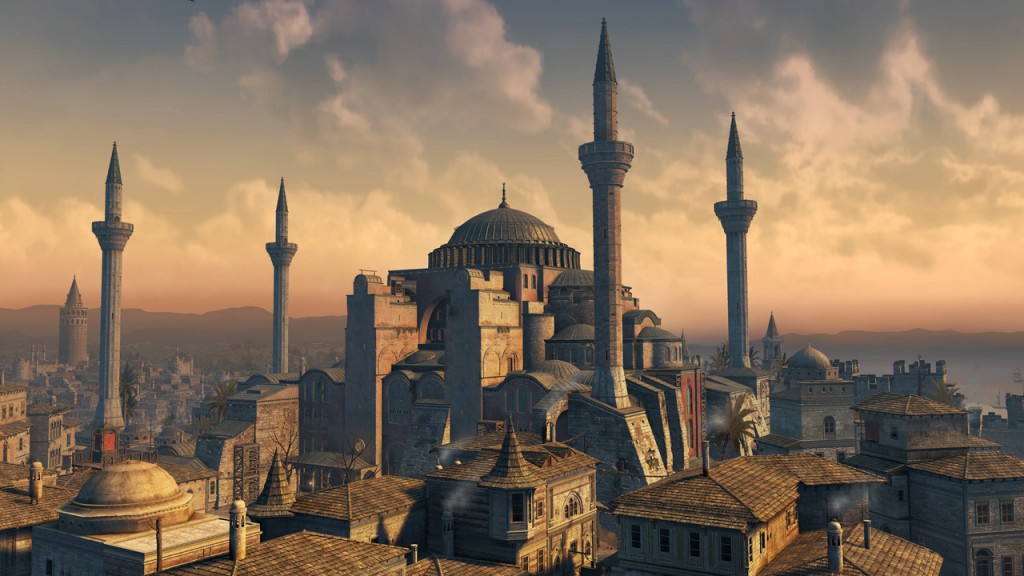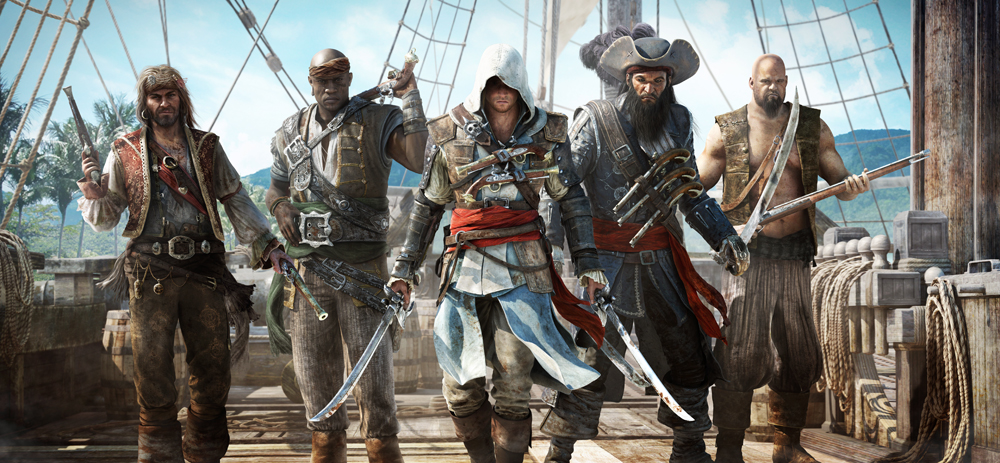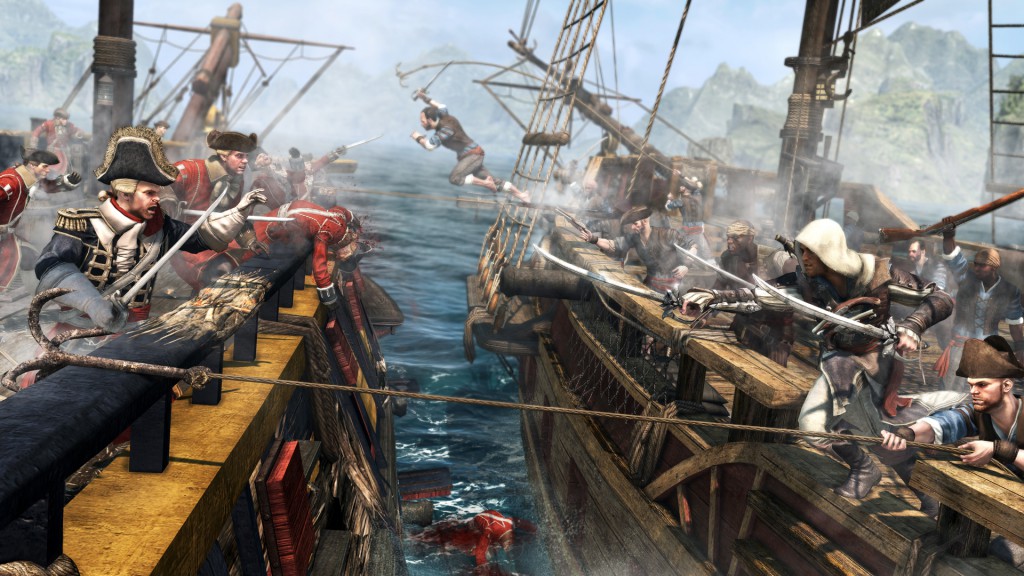This guest post is by Christopher Sawula, who is a graduate student in History at Emory University. He is interested in early American class and culture and is a Mellon Fellow at the Emory Center for Digital Scholarship. You can find him on twitter at @CGSaw or at his blog, The Uneasy Half-Literate. (http://uneasyhalfliterate.wordpress.com/)
The Assassin’s Creed series is not good history.
I hope this is not a controversial statement. The franchise is, after all, based on the concept that someone can use a machine to access the memories of their ancestors that are locked away in their DNA. This allows the human macguffin in the first five games, Desmond, to travel to the Middle East during the Third Crusade, Renaissance Italy and Constantinople, and Revolutionary North America. No one would mistake this blend of science fiction and historical fiction for a PBS documentary or an academic work. But most recently, Assassin’s Creed has moved from creating fictional narratives to promoting their own interpretations of historical events.
Originally, the developers maintained two general commitments to historical accuracy: the close modeling of period landmarks like the Hagia Sophia and Independence Hall, and the deaths of historical figures featured in the games’ narratives. Although the historical cause of death has been replaced by an assassination, the individual, the location, and the year of their death have been preserved. While I always enjoyed this inclusion of real historical figures, these details were promoted as window dressing rather than as selling points of the game.
In the past two years, however, Ubisoft has increasingly touted historical accuracy in its marketing of the Assassin’s Creed series. Beginning with the promotion of Assassin’s Creed: Revelations, Ubisoft introduced the slogan “History is Our Playground.” This slogan has also appeared in advertisements on both Google+ and Facebook for the upcoming game, Assassin’s Creed IV: Black Flag. Ubisoft has chosen to promote Black Flag as “a work of fiction that depicts the real events during the Golden Era of Pirates.” This confusing juxtaposition of fiction and historical truth is reinforced in the game’s recently released trailer. Black Flag promises to include the historical figures of Benjamin Hornigold, Calico Jack, Charles Vane, and Blackbeard in the years following the 1713 Treaty of Utrecht. Not only will your character meet these figures throughout the narrative, but the game will be telling “their true stories, rough and unvarnished.” Instead of historical fiction, Ubisoft seeks to depict authentic history within a fictional environment.
To some degree, Ubisoft has always touted historical accuracy as a way to introduce unfamiliar settings to their players. The first Assassin’s Creed was originally intended to be an open-world update to the Prince of Persia series. According to lead designer Patrice Desilets, the initial connection to Prince of Persia ultimately led the game to take place in medieval Jerusalem, Damascus, and Acre. Since then, Ubisoft has intentionally focused on “periods that are underrepresented in gaming.” This not only requires months of research and historical consultation, but also allows Ubisoft to promote the settings as a unique gaming experiences.
With Assassin’s Creed III and Assassin’s Creed: Black Flag, the increase in historical marketing seems to reflect the more immediate connection many players have to these time periods. Especially for American players, the American Revolution and the piratical Caribbean are more familiar environments than medieval Jerusalem or Renaissance Italy. By touting the historical accuracy of the game, as Ubisoft did for Assassin’s Creed 3 in a four-part video series on Amazon, the developers tailor their message to an audience who might be excited to explore environments from their own past. This familiarity with the setting, however, can also lead players to have pre-conceived expectations. In the marketing for Assassin’s Creed 3, for instance, Ubisoft cut scenes featuring the protagonist assassinating colonial soldiers. In British trailers, these scenes remained. Fearful that these attacks on colonists would alienate American consumers, Ubisoft tailored their advertisements (and the game itself) to conform to player expectations.
In two of the more recent trailers for Black Flag, Ubisoft appears to be reprising this strategy. In the trailer linked above, Ubisoft provides their own historical interpretation for the origins of eighteenth century piracy. In particular, Black Flag will argue that the economic conditions of the British Caribbean after the War of Spanish Succession led unemployed colonial sailors to embrace illegal maritime activities. The trailer is surprisingly specific:
“However, for thousands of British sailors, England’s pitiful holdings offer few opportunities. Now poor and hungry, and resentful of their distant king, these desperate sailors band together to live their lives as they see fit. Establishing ideals of true freedom, which would carry on for generations to come.”
This sentiment is echoed in the most recent trailer, this time narrated by the game’s protagonist Edward Kenway. Shedding light on his own (fictional) backstory, Kenway explains, “I once sailed for a King. I obeyed men of privilege and wealth. Now I bend my knee to no man. My only oath is to my crew, and together we will take back what is rightfully ours.” Kenway closes this declaration with a promise that, “As long as empires generate wealth and riches, we will be there to bleed them dry.” Establishing Kenway and his brethren as individuals acting outside the hierarchy and economic system of the British Empire, the trailer portrays eighteenth century piracy as a bastion of freedom and personal independence.
By framing the Age of Piracy in this way, Assassin’s Creed IV: Black Flag appears as though it will fall into the same trap as its predecessor, Assassin’s Creed 3. Rather than considering all of historical interpretations available to them, Ubisoft has chosen a single historical perspective and will represent it as “truth.” Instead of acknowledging that mariners turned to piracy for a multitude of extremely complicated reasons, they will be portraying pirates as the first true democrats in an imperial world.
It is important to note that Ubisoft likely drew this interpretation from existing historical literature. In particular, the developers or historical consultants appear familiar with the work of Jesse Lemisch and Marcus Rediker. Lemisch, in his 1968 article “Jack Tar in the Streets: Merchant Seamen in the Politics of Revolutionary America,” argued that while eighteenth century mariners were often rowdy, violent, and drunk, their battles with British impressment led them to develop sophisticated definitions of freedom and independence. Over time, this sense of liberty and injustice became crucial to the colonial protests prior to the American Revolution.
More directly related to Black Flag is the work of Marcus Rediker. Throughout his career, Rediker has asserted that pirates were men (and women) who rebelled against the developing capitalist system that had reduced European workers to abject poverty. Having already taken root in England and the rest of Europe, pirates waged a bloody, desperate battle to preserve a communitarian alternative to the hierarchical ideologies of race, ethnicity, religion, and gender. In the words of James Pritchard, Rediker’s pirates “are collectivist, anti-authoritarian, egalitarian folk heroes with enlightened views on liberty, transvestites, and slaves.” (“Villains of All Nations: Atlantic Pirates in the Golden Age by Marcus Rediker”, Review by James Pritchard, Journal of American History, Vol. 92, No. 2, (Sep., 2005), 588)
Based on the interviews, marketing, and information revealed by Black Flag’s developers, this is exactly how pirates will be portrayed. This is problematic because Ubisoft’s of insistence that Black Flag will be telling “true” stories within a fictional setting. While both Lemisch and Rediker have made valuable contributions to our understanding of Atlantic mariners and pirates, theirs are specific interpretations within a larger field of study. Daniel Vickers, for instance, has argued that until the nineteenth century, work on ships was seen as temporary employment for the younger sons of colonial farmers. Life as a mariner, then, was an occupation of last resort rather than one of freedom and rebellion. Similarly, Paul Gilje agrees with Rediker that mariners espoused notions of independence, but believes these views centered most commonly on personal, rather than political, liberty. These interpretations demonstrate that the reasons why mariners rebelled and embraced piracy were often complex and contradictory. This historical reality will likely be absent from Black Flag.
This emphasis on a singular historical narrative is complicated by the way in which the developer’s have married gameplay and story. As Trevor Owens explained in his 2012 article on linear game narratives, the machine at the heart of the Assassin’s Creed franchise allows the protagonist to “recover memories of what already happened.” Players, then, are not influencing or modifying historical events as they occur. Instead, the player is told that they’re seeing and experiencing events as they actually happened. If the player deviates from the established narrative by, for instance, assassinating the wrong target, the simulation abruptly ends and the sequence restarts.
This design structure, as well as the emphasis on historical realism, implies to the player that the Assassin’s Creed games accurately reflect their respective time periods. Even though the developers have never claimed to be producing interactive documentaries, this aura to accuracy permeates both the marketing and the discussion around the game. In a recent Polygon article, historian Mike Loades, who consulted on Black Flag, noted, “Of course it’s a fantasy game, but it’s anchored in the real world. They’ve got the bones of that real world right.” As Katy Meyers points out, Assassin’s Creed holds the potential to both educate and mislead players through their games. Throughout the years, players have taken to online forums to dissect the games’ settings and point out inaccuracies in dress, architecture, and character attributes. While leads many players to self-educate based on what they’ve seen in the game, it can lead others to accept what’s shown as historical truth.
In contrast with the earlier Assassin’s Creed entries that took place in the Middle East and Renaissance Italy, I suspect that players of ACIII and Black Flag are less likely to question the historical details. Both games reflect commonly held notions of the American Revolution and pirates and do little to challenge these expectations. To conform to the series mythos concerning democratic Assassins and authoritarian Templars, the protagonists’ side almost always stands for freedom and liberty, while the enemies seek only power and domination. In Assassin’s Creed III, this structure leads to an uncomplicated dichotomy between Patriots and Loyalists. Despite acknowledging some ethical problems with colonial positions, notably slavery and attacks against Native Americans, the protagonist remains committed to defeating a British presence portrayed as an agent of subjugation. While Ubisoft has stated that Black Flag will not ignore racism among pirates, it seems clear that the European powers will be depicted in a similarly authoritarian manner. Since this view of democratic good versus authoritarian evil confirms popular views of each era, the player’s expectations remain unchallenged and the game’s historical presentation survives further scrutiny.
In the grand scheme of things, this isn’t that big of a deal. Black Flag is, after all, a blockbuster video game invested in entertainment over historical accuracy. But I think it is dangerous when anyone, academic, game developer, or otherwise, presents their interpretation of historical events as “objective truth.” When you consider that this will be the first time the vast majority of players will encounter the early eighteenth century, it creates a situation in which a single viewpoint becomes representative of an entire era. Instead of presenting a singular narrative, I’d like to see the Assassin’s Creed series include the complicated historical views that would more closely reflect historical realities. Some Revolutionary Bostonians, for instance, did not agree with the strategies undertaken by the Sons of Liberty but still opposed British colonial policy. In addition, many colonists remained ambivalent throughout the Revolutionary War and refused to support the Continental Army. Those who did enlist in the Army were just as likely to fight for petty personal reasons as they were for motivations of political liberty. These voices would do little to change the overarching narrative presented by these games but would challenge the historical expectations of the player. Players could then be forced to negotiate between these views as they develop their own motivations for joining the Assassins. This could ultimately allow for each player to create their own version of the protagonist, one that would be viewed differently by non-player characters based on these choices. By including alternative and even conflicting perspectives, the developers would be able to push players to self-educate and in the process, bring more truth stories into their fictional setting.




this quote from the article jumped out at me:
Since then, Ubisoft has intentionally focused on “periods that are underrepresented in gaming.”
I’m curious what “gaming” Ubisoft is(n’t) paying attention to if they think that the Crusades, AWI, and 18th-Century pirates are somehow under-represented in “gaming”. Maybe the very narrow subset of “gaming” defined as “first-person console-based platformers from mass-market development shops” would fit that descriptor, but there’s been no shortage of games in those settings over the years. Rennaissance Italy might be thin on the gaming ground, but the others aren’t hard to find in “gaming” unless you’re wearing your console blinders.
Very nice article about the key problem in Historical Computer Gaming. Assassins Creed is indeed one of the finest examples for the neglect of serious simulation aspects favoring an entertaining narrative which is very easy to digest. I really wonder, how a company putting several millions of Dollars into a project like this, can so constantly overlook the opportunity to create something really great here. The technology is there, the historical knowledge is there and I think the demand is there as well (it is, this is why they constantly produce historical fiction) – why do they not finally create a simulation that contains all these controversial truths and narratives, historical science provides today? And I am not just talking about a “serious game” here. Meeting historical characters with different fates, motivations and social backgrounds could be so exciting if you just put a little effort into the staging. By putting contradictory narratives just besides each other in the same simulation would enable the consumer to decide for himself which one he deems to be more appealing. Simulations could become virtual history books, instead they are often not even entertaining entertainment on the intellectual level of pulp fiction. To me, this is explainable only by the laziness of producers who know that they dont need to produce good stuff when they just can sell crap. And thats what Assassin’s Creed eventually is, even if the Hagia Sophia is rebuilt unto the smallest stone.
I am a video game enthusiast. I have played video games since the early 80s when Atari 2600 came out. I recall summers playing Asteroids, Pac Man, Yar’s Revenge, ET, etc. In the 2000s, I continued with Xbox and enjoy the Halo Series. I developed a preference for “open world” games with Far Cry 3 and 4. Currently, I have made it past the halfway point of Assassin’s Creed IV and found the game fantastic. But I am aware of the controversies in FC3 and Assassin’s Creed IV.
Both games are set in the midst of “European colonialism” which had the reality of racism. Far Cry 3 was criticized by many minorities as a game for “white supremacy” when the “white guy” wins at the end against indigenous islanders. Similar claims are definitely possible against Assassin’s Creed IV.
I noticed the parts about slavery. Edward was clearly against it. He had an African quartermaster. The hard part for me is that I am Native American. I am aware that throughout the West Indies in the 1500s to 1700s many tribes were wiped out to extinction. Assassin’s Creed greatest reverence to Native American’s is bringing alive the character of the Taino Woman. At one point, Edward even defends her in a temple against European colonists while also killing the Taino Woman’s antagonist (a white female). So the game seems to empathize with Native Americans to some extent.
I got to the latter stage at an island where Edward’s job is to “clear” the island and cave of indigenous warriors defending their temple. I stopped at this point. Realistically, I do not believe the game creators intended to “support” genocide or racism against Native Americans. But rather, it appears the script brings the point that some indigenous people are “allies” of Edward while others are “hostile.” The Taino woman is like an “ally” (at least to this point) but the tribal guardians are “hostile.” So the game is not truly “horrific” in glamorizing genocide.
But still, the harsh reality of genocide and extinction of many indigenous groups in the region make it hard for me to truly enjoy this part. I will probably just try to work my way quickly through that part and finish the game. I don’t like it though. However, Edward in raw numbers slaughters many European colonists who were slavers and genocidal racists. So I am not that “upset” about it. The game seems reasonable.
Bioshock’s part 3 was worse. They had the “antagonist” as a participant in the Wounded Knee slaughter of 1890. I won’t even play that one despite having enjoyed parts 1 and 2 of Bioshock.